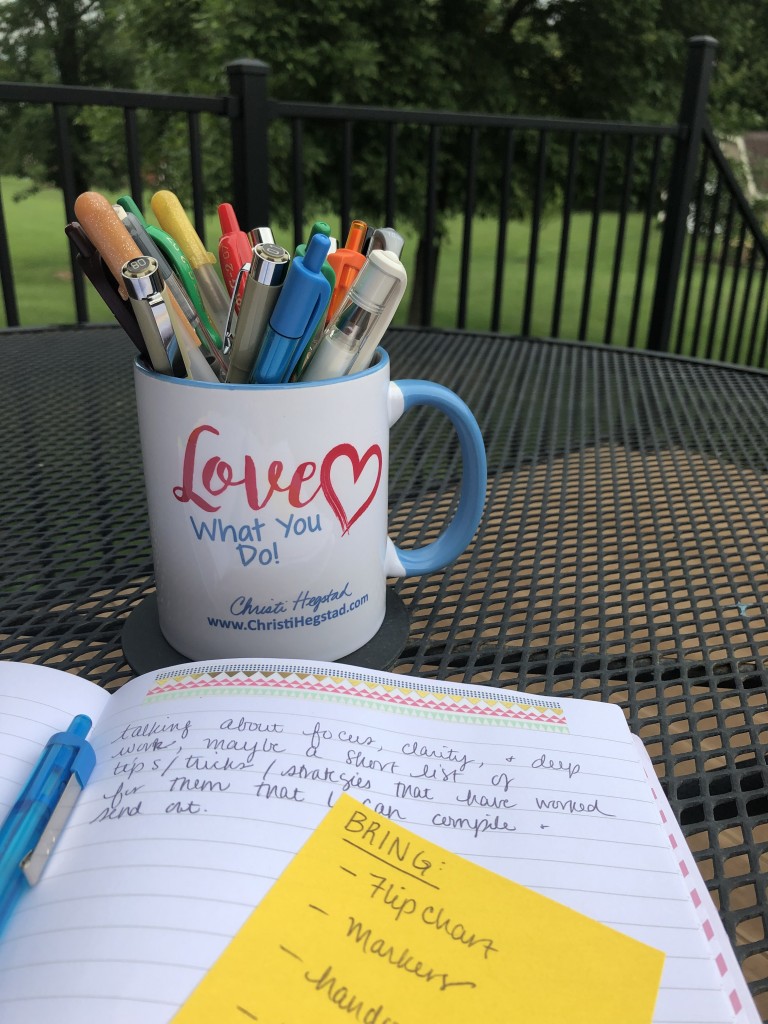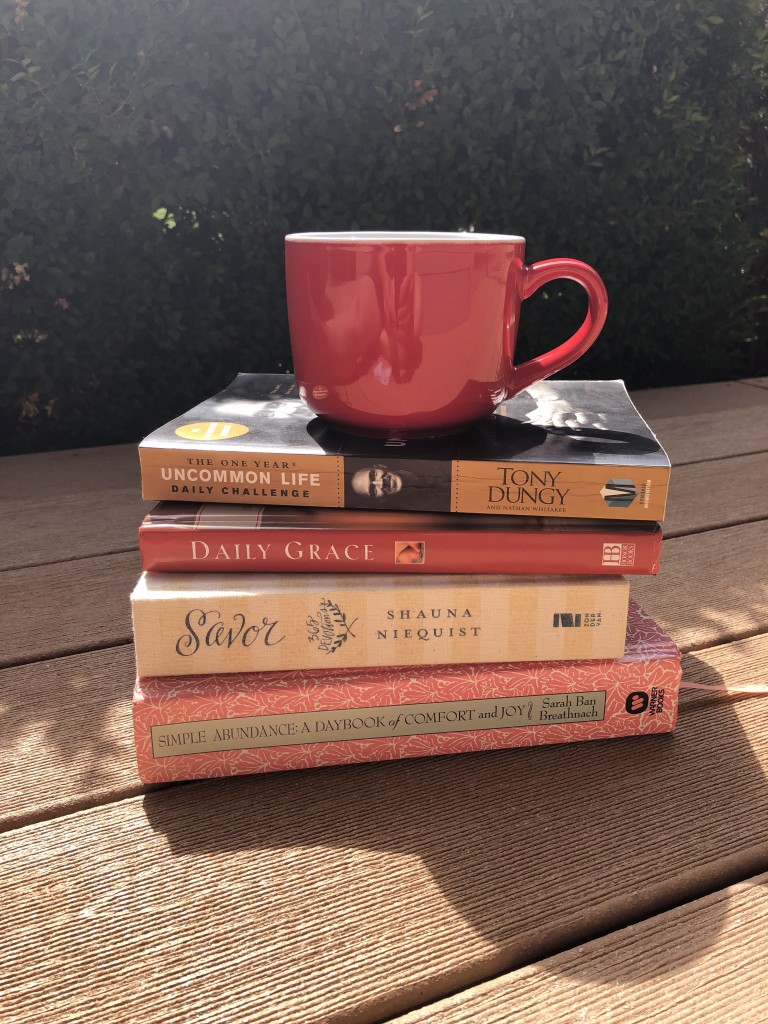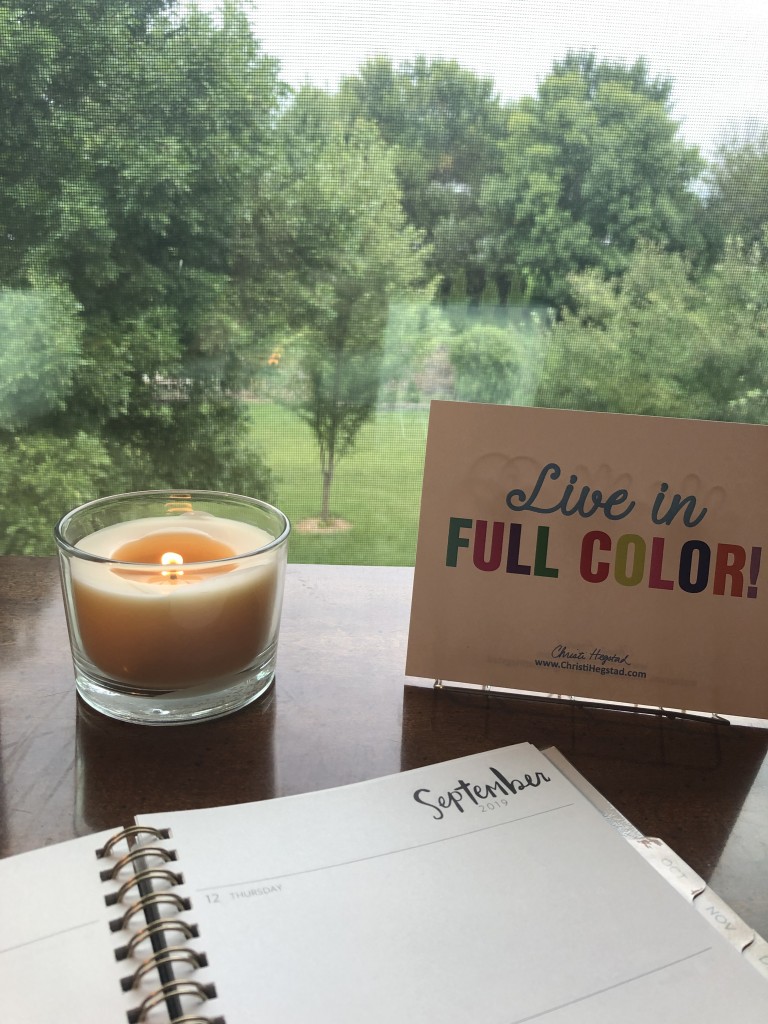
While speaking about my entrepreneurial journey recently, a fairly new business owner asked, “If I could do just one, super-practical thing in the next 24 hours to boost my success, what would you recommend?”
Several ideas popped into my mind, but the simple, straightforward one that rose to the surface?
Start a morning practice.
I mentioned how this single action, which I essentially started because I was tired of my own morning crabbiness, has become one of the longest-running and most-valuable habits I have ever established.
The more I think about it, the more I realize that nearly every success I’ve experienced in my life – personal, professional, relational, or any other form – has taken root in my morning practice. This daily routine has provided the space for ideas to arise, inspiration to appear, action plans to come out of my head and onto paper, and difficult conversations to be pondered before taking place in real life.
It has also allowed the opportunity to start the day with intention, connect with my intuition and faith, generate solutions to problems that seemed unfixable just the night before, and decide – every day – who and how I want to be in the world for the next 24 hours.
My morning practice has even been where my creativity has flourished, periods of grief have flowed, and important life decisions have been made.
I have definitely had other key contributors to my personal and business growth. But the glimmer almost always first appears during the opening hour of my day.
In the past few weeks, I’ve had numerous requests to share the specifics – like, the detailed details – around how I spend this hour. Today’s blog, perhaps the longest I’ve ever written, is my response to those requests!

Why Implement A Morning Practice?
A quick internet search will yield dozens of reasons for starting a morning practice, but I would turn the question back to you:
Why do you want to implement a morning practice?
How do you believe you will benefit?
While the research and anecdotal evidence are important, your personal reasons will motivate you into action more than anything else. Then, experiencing those benefits will help you sustain your practice.
For me, the benefits have been plentiful and longstanding, including:
* Starting the day on my own terms, choosing my mood and attitude before anything external can influence
* Putting first things first, and feeling a sense of fulfillment even if the rest of the day doesn’t go as planned
* Greater patience
* Better, and longer lasting, clarity and productivity
* Increased self-confidence
* Stronger sense of personal agency
* Enhanced purpose and intention
* Higher motivation, feeling ready to kickstart the day
* Greater self-awareness
* Peacefulness, even if the day becomes challenging
Think about what you hope to gain by starting your mornings on purpose. Not only will this support your motivation, it will help ensure you actually obtain the benefits you’re seeking.

My Detailed, Step-By-Step Morning Practice (Alllll the specifics!)
When I first started my morning practice, I had just opened my coaching business and had three kiddos under the age of five. On any given day, my practice at that stage of life might involve just ten minutes of quiet time before the day began, or might be done while snuggling with a baby, or might even take place at a different time throughout the day. I decided early to focus on being intentional rather than perfect.
With that in mind, what follows is my specific current practice – certainly not the be-all and end-all to powerful morning routines. Toward the end of the article, I will share ways you might adapt these ideas to suit your own personal needs. You do you!
Now, for the nitty-gritty details:
My morning practice actually begins the night before. I make sure my supplies (journal, pens, coffee mug, etc.) are in place. If I had to start the day looking for things, I don’t think I would hop out of bed very easily!
I also set my coffee maker to auto-brew, and I *love* walking into the kitchen to the scent of freshly-made coffee. If you prefer a French press or tea, however, you could incorporate your beverage-making process into your morning routine by making it an experience in mindfulness.
In addition, I set two alarms – one for 5:30am, one for 5:55am. I will explain more about this in a moment.
1) Wake up at 5:30am
This, not surprisingly, literally involves turning off the alarm and immediately getting out of bed. The key here is not hitting snooze.
I used to hit snooze. I used to rely on snooze.
What changed it for me was realizing that when I hit snooze, my first action of the day basically involved breaking a promise I made to myself the night before – which felt out of integrity. Missing the mark on my first goal of the day (to wake up when I said I would) also made me feel behind before I even got started. Therefore, eliminating snooze became highly important.
2) Drink 2 glasses of water
I have read that drinking water first thing in the morning helps detox and purify your body as well as assists in feeling more awake. The primary reason for me, I must admit, is that I’m not always the greatest at drinking enough water during the day. By starting off with two full glasses, I kickstart this healthy objective before my mind is awake enough to say, “Are you sure you don’t want _______ [insert nearly any other beverage here] instead?”
On a side note, last spring I found myself a really pretty goblet, and this makes my water-drinking much more delightful! 🙂
Approximate time: 5 minutes

3) Meditate
Consistent meditation is a fairly new practice for me and I love it. I use an app on my phone called Insight Timer; I have several guided meditations bookmarked, otherwise I will use the search function for a keyword like ‘clarity’ or ‘confidence’ or ‘peace,’ depending on what I feel I most need.
I typically stay awake during my meditation … but that second alarm I mentioned that rings at 5:55am? That’s just in case I drift off while meditating. My coffee maker is also set to brew at 5:45 so coffee awaits me when I finish my meditation. Clear mind + fresh coffee = bliss, if you ask me!
You can read more about my experience bringing meditation into my routine here.
Approximate time: 10-15 minutes
4) Journal
I then pour a cup of black coffee (Arco is my all-time favorite, though I enjoy a variety of brands) and settle in with my journal. I have been journaling since I was eight years old (so, a few years now 😉 ) and this makes up the bulk of my morning practice.
I start every journal entry with the date, time, and my location; I know some people who also record the weather or their mood/energy level, too. From there, it’s a stream of consciousness that might include ideas for upcoming events, things I’m concerned about, dreams I had the previous night, goings-on with family members, drafts of an article or course outline, thoughts around the day’s activities, progress on goals, ways to improve myself, problems I’m experiencing, where I’d like to go on vacation … nothing is off-limits.
If you’d like to try journaling but aren’t sure what to write, take a peek at these prompts for starters.
Approximate time: 30-40 minutes

5) Pray + offer gratitude
While my faith plays a part in all aspects of my life, how it typically shows up in my morning practice is via my journal. I will pray for people on my pages; I also end nearly every journal entry by writing my gratitude for family, love, health, meaningful work, the gift of another day – whatever comes to mind in that moment.
I include my Mom in that portion of my journaling as well. She shined such a light in this world, and she gave me my first journal all those years ago. It seems a natural and fitting way to stay connected with her.
Approximate time: Incorporated into journaling time
6) Read
I always have a book with me, usually a fiction and a nonfiction going at any given time. In the mornings, however, those books are pushed to the side in favor of a devotional or some type of inspirational text. Lately I’ve been reading Tony Dungy’s Uncommon Life Daily Challenge (my third time with this one); other times it might be a page-a-day type book (Simple Abundance by Sarah Ban Breathnach has made a few rounds with me, too) or even a single passage or quote.
I read, then spend a moment pondering how the message might apply that day or what it means to me personally.
Approximate time: 5 minutes

7) Preview the day + set an intention
Before leaving my cozy seat, I will take a quick look at the upcoming day’s events and often choose an intention word. For example, if I have back-to-back meetings and appointments and events for many hours in a row, I may choose a word like “Energy” to remind me to pay attention to my energy; if I have some difficult conversations or challenges ahead, I might pick “Calm” or “Smile.” Sometimes I will record the word, but usually I just think it and then recall it periodically throughout the day.
I’ve been doing this last piece off and on for years, and I’m still surprised at how helpful choosing one word to represent the day can be!
Approximate time: 2-3 minutes

In all, my morning practice takes right around an hour. After this, I focus on greeting my family members and setting the rest of the day in motion. I have another, much shorter (5 minutes or so) practice that I engage upon first arriving to the office – let me know if you’d like to see a blog on that as well.
Before I share a few more thoughts, please note that while this is my typical routine, life periodically seems to have other plans and I adapt. Some days my routine may start later, some days earlier. Sometimes I have an early morning meeting, so my practice is significantly shortened. I alter as life requires but strive to be ‘flexibly consistent.’
Other Ideas To Incorporate
As I mentioned, my morning practice has evolved over the years, and I’m sure it will continue to do so. Other components you may wish to consider:
* Affirmations – writing, reading, saying aloud
* Exercise – running, walking, stretching, yoga
* Nutrition – healthy breakfast, snack, smoothie
* Scripting – writing out your ideal vision of the day ahead
* Breath of fresh air – stepping outside for a few deep breaths (even in an Iowa winter!)
* Greetings – writing and sending a card or note
The options, of course, are truly endless.
Helpful Hints + Habit-Building Tips
The benefits from my morning practice started appearing fairly quickly and have motivated me to continue for around 15 years now. While I will sometimes intentionally step away from my practice (ie, on vacation), I definitely feel a bit ‘off’ or antsy on the rare days that I accidentally miss. A few tips that I have found instrumental:
– Keep it screen-free.
When you begin your day checking email or scrolling social media, you are essentially allowing other people – perhaps people you don’t even know – to impact your mood, fill your mind, and determine your priorities before you’ve had a chance to do this for yourself. Not cool.
Keep your phone off or, even better, in another room. I use mine to access guided meditations on Insight Timer, but this wasn’t until years into a screen-free morning practice. If I felt the temptation to hop on social media or surf the web was too hard to resist, I would leave my phone elsewhere and practice meditation in a different way.
– Start small.
I really want to reiterate this point: Your morning practice does not have to follow someone else’s actions or timeline. Can’t realistically manage an hour in the morning without sacrificing too much sleep? Start with 5-10 minutes, and fill those moments with something truly enjoyable that makes you want to get out of bed. One of my clients pours a cup of coffee to savor while walking through her garden, a morning routine that takes less than 10 minutes but starts her day with purpose and positivity.
And if you don’t even have 5-10 minutes? Shorten it even more. Perhaps get in the habit of turning off your alarm and thinking of 3 things for which you are grateful before you get out of bed. Put a sticky note of affirmations on your mirror and read them every morning while you brush your teeth. Mentally send a bit of love and goodwill out into the world before the busy-ness of the day sets in.
Don’t worry about making it a fancy or perfect experience – just a meaningful one.

Designing YOUR Morning Practice
OK, friends! If you’ve stuck with me this long, you are definitely ready for your own morning practice. What will it be?
To get started, pull out a notebook or journal and ask yourself a few questions:
– Why do I want to implement a morning practice? How do I feel it will benefit me and/or those around me?
– What are some ways I might like to spend this time? List as many as you’d like.
– Of those ideas, which one or two do I want to start with?
– How long would I like my morning practice to be? Be realistic here; you can always add time as you develop the habit.
– What time will I begin my morning practice? Building a consistent routine is helpful, however your unique situation may require flexibility if you work varying shifts, have little ones to care for, etc. Answer this question only if it serves you.
– What might get in the way of my morning practice? How will I address those potential obstacles? Get specific. If “Hitting snooze” is a potential obstacle, put your alarm at the other side of the room, or commit to calling an accountability partner who is also developing a morning practice, or have your coffee maker’s auto-brew function set to a certain time. (Because you will want to drink that coffee when it’s fresh, right?!) 🙂
Decide to engage in your morning routine for the next week, then re-evaluate. What have you noticed? What’s working well, and what’s not? Tweak it and commit to another week.
Your Next Inspired Action
“Take excellent care of the front end of your day,” writes Robin Sharma, “and the rest of your day will pretty much take care of itself.”
I have definitely discovered that when I start my day with intention, the rest of the day is far more likely to follow suit. And on the days that feel a bit more ‘downhill,’ I seem better able to return to that place of purpose and positivity that I experienced in the morning. It’s like exercise: Once you’ve gotten used to running 3 miles a day and then you miss a couple days, it’s much easier to pick up where you left off than if you haven’t been running since 2009.
As a coach, I want to make sure you’re not just reading but also taking action to achieve your goals and live in full color. Please post below, on Instagram, or on Facebook and let me know what your next inspired action is! And if you’d like support in designing or foll0wing through on your morning routine, contact me to talk about coaching or ASPIRE Success Club possibilities!
Here’s to your positive, purposeful mornings!
Christi Hegstad, PhD, PCC is the Certified Executive + Personal Coach for difference-making achievers! Clarify your vision, free up time, and confidently reach bold, compelling goals that matter! Contact us today for coaching, speaking, and Mastermind opportunities, or click here and fill in the blue box to join our email community.





